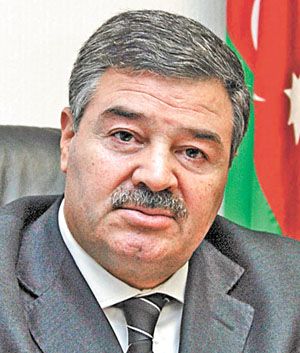A symbol of deep love for the Motherland
Studying the Bard of Ukraine’s creative legacy in Azerbaijan began in the earnest in the early 20th century
Taras Shevchenko, a poet and freedom fighter, a great son of the Ukrainian people, is commonly seen as an equal of the world famous authors. Shevchenko’s creative legacy is a huge contribution to the treasury of not only Ukrainian literature, but the world one, too.
His historic achievement was expanding the boundaries of private self-consciousness of the human being to the nationwide scale. Shevchenko’s works depict national life not as a support for the feelings and thoughts of advanced intellectuals, not as a goal of their self-conscious ideological quests and aspirations, but as the only possible and real scene of their existence.
Fates of some of the Bard’s close associates, who were also sent into exile, were associated with Azerbaijan. For example, when serving his term in the Caucasus, Shevchenko’s fellow member of Saints Cyril and Methodius Society Mykola Hulak lived in Ganja where he studied the works of Nizami Ganjavi, Molla Panah Vagif, and Azerbaijani folklore. He made a prose translation of Muhammad Fizuli’s Layla and Majnun which Oleksandr Navrotsky, another member of the secret society and exile, rendered then in Russian verse. For many years, Hulak was friends with the novelist and playwright Mirza Fatali Akhundov, publisher Jalal Unsizade and other Azerbaijani culture figures. He died in 1889 and was buried in Ganja on peasant cemetery (the grave is now lost).
Studying Shevchenko’s rich creative legacy in Azerbaijan began in the earnest in the early 20th century, in connection with the 100th anniversary of the poet.
Let us recall that the Ukrainian Shevchenko Prosvita society had a branch in Baku since 1907, with its events attended by representatives of the Azerbaijani culture, too. This branch disseminated knowledge of Ukrainian literature, “theater of luminaries,” celebrated anniversaries of the Bard, Ivan Franko, Lesia Ukrainka, etc., covered in newspapers Baku, Kaspii, and Bakinskie Izvestiya. On the initiative and with support of local intelligentsia, a bust of Shevchenko was installed in the Azerbaijani town of Zaqatala in 1907. (With the establishment of the Bolshevik regime in Azerbaijan, the local Prosvita ceased to exist.)
The first edition of incomplete Kobzar by Shevchenko was published in Baku in 1934. Its translators, famed poets Ahmad Javad and Mikayil Mushfig were killed in 1937 as “enemies of the people.” Collections of Shevchenko’s poems were published a dozen times later on, but they used other interpretations, created by Samad Vurgun, Suleyman Rustam, Rasul Rza, Osman Sarivelli, Mirvarid Dilbazi, Nigar Rafibeyli, et al. A famous Ukrainian studies scholar (and in particular Shevchenko scholar) Abdullah Abbas compiled book My Heavy Thoughts, also published in Azerbaijan. By the way, Abdullah was awarded the Rylsky Prize in 1984 for best translations of Ukrainian poetry. He also penned the monograph Azerbaijani-Ukrainian Literary Relations (1982), the first in Azerbaijan to study a century of relations, beginning with 1840. Literary relations after World War II were studied by Vaqif Arzumanli who published a similar work in 1982.
In the middle of the 20th century Azerbaijan’s national poet Samad Vurgun wrote: “I saw and heard how much intelligentsia and common people of Ukraine like and read our works. We, Azerbaijanis, lovingly read the poetry of Taras Shevchenko, Ivan Franko and such modern Ukrainian poets as Maksym Rylsky, Mykola Bazhan, and Pavlo Tychyna.”
The Bard’s poems aimed to wake the national spirit. His rebellious poetry served the national revival.
Now his poetry is again with people:
Love your Ukraine.
Love her... in cruel time,
At your last, severe minute
Pray to the Lord for her.
Today, the poetry of Shevchenko is carefully read and respected in Azerbaijan, while a monument honoring the classical Ukrainian author stands in Liberty Avenue in Baku.
The Nizami Institute of Literature (National Academy of Sciences of Azerbaijan) held on March 5 a research workshop devoted to the 200th birth anniversary of the Bard. The Embassy of Azerbaijan in Ukraine in cooperation with representatives of the Ukrainian intelligentsia organized and hosted a roundtable called “Taras Shevchenko, a Symbol of Deep Love for the Motherland” at Kyiv National Linguistic University on March 3. The living spirit and inextinguishable light of Shevchenko’s verses will serve to promote even greater enrichment of cultural wealth in our two nations.
Newspaper output №:
№17, (2014)Section
Culture





